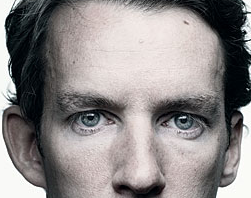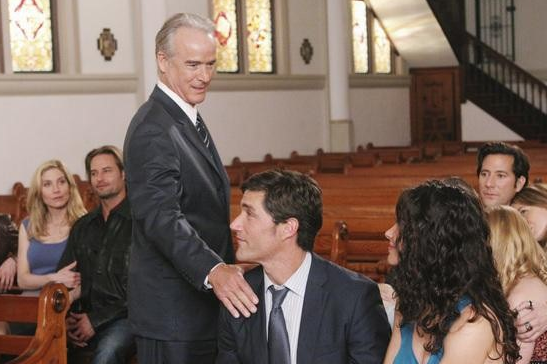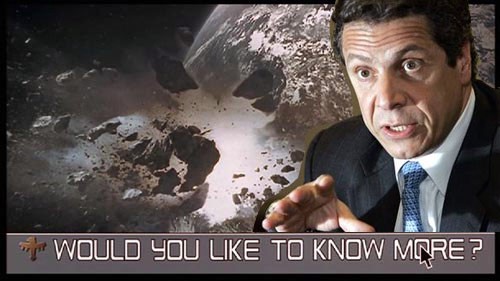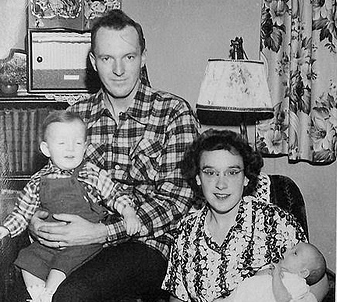The Weekend Was Really Icy For Bros

Apart from reports of icings late on Friday at Pitchfork and various other late-in-the-day icings, we also heard that the author of our post on “Bros Icing Bros” was iced three times on Saturday alone. (We expect an update later. When he gets out of the hospital, I guess.) Will this nightmare never end? No, because here are Salon’s Alex Pareene, Gawker’s Hamilton Nolan and NY1’s Roger Clark getting iced at the mini-putt.
The Cruzin Cooler: The Latest Proof That We Are Living In A Future Designed By 18-Year-Old Dudes
The people responsible for marketing the Cruzin Cooler, a hybrid of your average Coleman and your crappy motor scooter that is apparently also useful for toting around laundry, proclaim in the mini-infomercial above that the product is “not just a cooler, it’s lightweight transportation” — you know, like a Rascal, only with a beverage-transport option as pretty much its only feature. The motorized versions start at $259 (plus shipping); the countdown to this item being combined with bro-icing and attempts to exceed the proclaimed internal speed limit of 13 mph — perhaps in some sort of variation on this theme — starts now. (Wait, bro-icing didn’t somehow become totally over after this weekend, did it?)
BP's Media Strangehold on the Ground in Louisiana
BP’s Media Strangehold on the Ground in Louisiana

This account of being on the ground in Louisiana, where BP is really running the show, is pretty horrific. Have you felt like you’ve been unable to find any reporting from there? That is in part because pretty much everyone has ceded control of the actual physical territory to BP. Although the company is also occupied with scooping up spilled oil on the beaches-which makes Fake Sarah Palin’s Twitter joke (“I’m so heartbroken about this spill in the gulf situation. All those animals. They’re polluting our oil.”) all that much more biting.
The Internet: A Series Of Little Boxes On The Hillside

This week’s edition of Virginia Heffernan’s “The Medium” is a meditation on what she calls “the death of the open Web” thanks to the rise of The App, the walled garden where content is approved (and profit-shared in) by Apple. An interesting point! But it’s based on a fairly flawed premise: “In the migration of dissenters from the ‘open’ Web to pricey and secluded apps, we’re witnessing urban decentralization, suburbanization and the online equivalent of white flight,” Heffernan writes. Which, uh… not for nothing, but online culture has been all about settling in with demographically similar enclaves — the term “eternal September,” which dates all the way back to 1993, comes to mind. (And let’s not even get started on the amateur racial studies that are taking place on Twitter by people who are looking in from the way outside.) Perhaps she could have, instead of “white flight,” used the analogue of the gated community, as opposed to the poor old suburb where any driver looking to take a shortcut to the highway can just whiz around the sidestreets, stopping only to pee on some poor homeowner’s lawn when it’s absolutely necessary?
José Lima, 1972-2010
Journeyman righty and reggaeton singer José Lima passed away after suffering a massive heart attack on Sunday. Lima, who resurfaced on Friday announcing his intentions to open a youth baseball academy in his hometown of Los Angeles, was an effervescent on-field personality during his 12-year MLB career, calling the time he spent on the mound “Lima Time” and proving himself good at whipping up crowds — even when his pitching performances were, shall we say, not quite Cy Young material. He also has a fantasy-baseball drafting strategy named in his honor. Lima was 37.
Portrait of an Addict to Drug Memoirs With Terrible Titles (As a Young Man)

I just couldn’t stop myself. I knew that after the third or fourth page, I’d feel sickened, queasy. Paranoid even. Reading the drug memoir would make me not only feel rotten inside, but I’d keep looking over my shoulder as I huffed down each page, convinced that strangers were watching me, judging me, mocking me. They probably were. And it wasn’t just the terrible use of present tense. But I just couldn’t get enough. I’d done it before. I’ve missed first-class flights to Europe, and quit my job on a whim, and had sex with cab drivers and even hung out with black people just to read more $350,000-advance memoirs about white people smoking crack. Oh sure, I had $70,000 in the bank and a great-looking if one-dimensionally-portrayed boyfriend who really cared. You would have thought there’d be enough cash and flexibility in my life to support my drug memoir problem and still let me take part in normal life. But it wasn’t true. I was willing to throw it all away just to get naked in a hotel room at the Newark airport and admire myself shirtless while reading yet one more memoir about The Joys of Throwing It All Away In Pursuit of Crack.
43 Answers To Unanswered Questions About "Lost"

I am a “Lost” apologist. Best to get that out of the way first. The show came to me at an important part in my life. I had just moved across the country and into my cousin’s guest bedroom about 40 miles north of Los Angeles proper. I knew no one. ABC premiered the show two days after I settled in. I spent the first year of my West Coast existence logging onto every “Lost” message board on the Internet. You know those people who were obsessively dissecting the Blast Door map in season two? That was me.
Not coincidentally, it’s one of the only shows I’ve watched from pilot to finale on a week-to-week basis. It’s a lot tougher to critique something when you live with it for that much time. You learn to accept its faults. And if you don’t, then you’re obviously a self-sadist.
But, as a network television show that was filmed over a six-year period-as opposed to pretty much every form of media where the schedule allows for planning the complete narrative before shooting-there were bound to be a few holes left the storytellers couldn’t get to. Let’s try to logically fill in a few of those, shall we?
So, what the fudgesicles happened in the finale anyway?
Here’s what I got: All the stuff that happened on the island actually did happen. (“Whatever happened, happened.”) Meanwhile, all the stuff that took place in the “sideways” universe this season was really in a Matrix-like purgatory after each individual character died, although they all died at different times and although they all resemble each other from the period they “knew” each other, because it would be too “Six Feet Under” if Kate came to the church as an old woman. And all this despite what Christian Shephard said about everything being “real.”
Come again?
Let’s take Jack’s life for instance: He dies on the island at the end of the finale. Afterward, he wakes up in purgatory and goes on living, la-tee-da, in this fake life until he’s forced to realize that he’s dead. Meanwhile, everyone else who survived the island stuff (Ben, Hurley, Sawyer, Kate, etc.) live their own lives until they eventually die and are then transported to this purgatory universe via some psychic MeetUp.com until they themselves are forced to realize they’re dead. Seeing as this is an ensemble show, everyone needs to realize at the same “time” (though there is no “time” here) in order to “move on.”
The island wasn’t purgatory?
Oh no. All that stuff was real. It’s probably best to look at the show in two separate phases: (1) All of the stuff in seasons 1–5 and the island action in season 6; (2) All of the “sideways” stuff in season 6. If you wanted to make it into a timeline, take all of (1) and then, whenever a character dies, they go into a holding chamber. Once everyone dies, in their own timeline, the holding chamber opens and (2) starts. The series concludes with everyone in the church together going into The Beyond.
Can you somehow use “The Sixth Sense” to explain this?
Sure. They’re all Bruce Willises and, I guess, an Emotional Experience is Haley Joel Osment. That Emotional Experience could be Sawyer and Juliet touching, Claire looking at Baby Aaron, etc. Once they’re woken up, they do their best to facilitate Emotional Experiences for the others characters.
That certainly didn’t help.
Let’s move on then.
Why does Ben stay back?
My guess is he wants to spend time with his daughter-and maybe even bang the non-crazy Rousseau a bit-before moving on. Or perhaps since he’s a stone-cold killer he has more atoning to do before some higher being allows him to move on. I’m rooting for the hot making out with Rousseau scenario. She cleans up real nice.
What about the other people who don’t go?
Each one has their own reason not for leaving yet. Eloise wants to stay as long as possible with her son Faraday, since she has a bunch of guilt left over from killing him before he was born. (Don’t get me started with that time-loop.) Not sure about Charlotte. Ana Lucia is “not ready yet,” according to the all-powerful Desmond, for whatever reason. Michael, meanwhile, is still stuck on the island with a whole lot of other lost souls, whispering away for a long, long time.
Then what happened when the nuclear bomb went off? It didn’t split reality?
Not really. It just shot them back into present-day, the island-half of season 6. As far as it starting the “sideways” universe, that was more due to the fact that if the island didn’t exist-if the plane was allowed to land instead of crash-then the Most Important Part Of Their Lives would have never occurred. Meaning, the island has to not exist in this made-up purgatory so they can continue pretending they’re not dead. Does this make sense at all?
Uh. Sure…
Think of it like this. You’re a ghost but you don’t want to move on. So you create this dream world where things are different for you. Have a bad relationship with your dad? Now you can redeem yourself a bit by having a great relationship with your son? Looking for revenge because a con man indirectly killed your parents? How about, this time, you use your street-smart powers for good and be a cop?
Oh, sort of like Mulholland Drive?
Sure. Like that. Except not as blatant a “happy place.” Reality seeps in a bit more often here, so much so that they find themselves living nearly the exact same lives, even ending up on that same fateful plane in this dream world. And sometimes, the world they create is not always great. Kate’s still on the run from the law. Charlie’s still drugged up. Desmond, instead of being in love with Penny, is globe-trotting on Charles Widmore’s expense account and macking on stewardesses left and right.
That sounds alright to me.
Stop being a jerk.
So, if all of the island stuff actually happened and not purgatory, can we nit-pick it?
Can we ever!
Fill in the blank. The island was ____.
A mysterious, magical place with a bunch of healing power and a shitload of electromagnetism. It was difficult to find, maybe because Jacob was camouflaging it. Basically it was the fountain of youth, the Universal MacGuffin, that thing everyone is after once they realize it exists. It’s why Widmore and Ben have been fighting with each other for its ownership for so long.
Speaking of those two, they had some “rules” that were never explained. As did other factions. What was the deal with all those rules?
There were three sets of rules that were independent of each other. Ben and Widmore couldn’t kill each others’ kids, a pact they apparently made off-camera at some point. When Widmore broke that rule, all bets were off. The second set of rules were that Jacob and The Man in Black couldn’t kill each other, a magic rule (magic meaning it couldn’t be broken) sent down by crazy Allison Janney. This is why Ben was needed as a murdering intermediary. The third set was another magic rule that The Man in Black couldn’t kill any of the Candidates. He could kill people who weren’t, however, which accounts for him killing Mr. Eko. I mean, other than the fact that the actor who played Mr. Eko, for whatever reason, hated working in Hawaii.
What was that Smoke Monster anyway? Am I wrong to think he was some kind of manifestation of Pure Evil who’d destroy the world if he got off the island?
I’m comfortable with that. Once The Man in Black got tossed into the Light, let’s say it took the evil in him and turned it into smoke. And if he got off the island, he could fuck everyone up. That sound good?
…. Sure.
Meanwhile, Jacob being alive kept him on the island. That whole corked bottle thing. Once Jacob was dead, he could leave. As long as the Candidates were dead. Or something.
Or something?
There are plenty of inconsistencies in this.
Like what?
Well, why does the island need to be sunk for him to leave? Why didn’t he just do another one of his “Get The Candidates In One Place And Kill Them All” plans? If those large electromagnetic pole thingies could keep him on the island, why didn’t they just put those on the island’s perimeter? Why was magic ash able to keep him at bay… until it wasn’t anymore?
Next: So what was the deal ages ago with that ash that surrounded Jacob’s cabin? And what happened to Evil Sayid?
Yeah, hey so what was the deal with that ash around the cabin? Didn’t Ben think it was Jacob’s?
He did, but that doesn’t mean anything. Ben always thought he was taking orders from Jacob, but who knows? Ben admits he never saw Jacob and there’s that bit in the second-to-last episode where he explains, “I was told I could summon the Monster. That’s before I realized it was the one summoning me.” Sounds like a guy who’s questioning just where he was getting his orders. Since the Monster was able to turn into pretty much anyone, there’s a good chance he spent most of Ben’s life just fucking with him so he would get to the point where he’d happily plunge the knife into Jacob.
Speaking of the Monster being able to turn into anyone….
I’ll stop you there. No, I don’t know the difference between the Monster using dead bodies that are on the island, to bodies that are not dead, to straight-up ghosts or hallucinations on the island. I will say I’m pretty sure that horse that Kate saw wasn’t the Monster.
So, what are we meant to take from all of this? Is there an all-encompassing message with Jacob, Man in Black, etc.?
My gut instinct: Question authority. There is no true “God” being on this show. Jacob and the Man in Black were just two regular fallible dudes. They just happened to (a) never age; and (b) be a giant plume of smoke. Their followers, whether it was Richard Alpert and his band of Temple dwellers, or Ben and the folks in the Dharma Barracks, were just blindly taking orders. Look at all that nonsense with Sayid in the Temple this year.
What do you mean?
Well, when he came back to life, Dogen and John Hawkes said he was evil because he failed whatever bullshit test they gave him.
So?
So, I think Sayid was never evil after he came back from the dead. The Temple people didn’t really know what the fuck they were doing. They were kind of following Jacob but, like all religions, had to fill in quite a few blanks on their own. And those blanks were filled with nonsense and superstition, leading to them concluding that Sayid was evil for some unknown reason.
But didn’t Sayid kill them? (And didn’t he get all weird and blank-faced?) That’s pretty evil.
That’s just a kind of self-fulfilling prophecy at that point. If you tell a guy who’s been struggling with whether or not he’s good for 5 seasons that he’s pure evil, why wouldn’t he fully embrace that?
But, wait. Jacob touched all of the Candidates at various points in their lives and steered them towards the island. That’s got to be kind of God-like, right?
Having God-like powers does not make one God-like. I mean, shit, if he was completely infallible and God-like he wouldn’t have allowed himself to be killed, right?
I guess not. But along the same lines, Jacob didn’t touch Hurley and Sayid until after they’d already left the island? What’s up with that?
Kind of points out the whole “not being God-like” thing to me. I’m going to claim that he didn’t know those two were official Candidates until they’d already got to the island and he had a chance to look them over.
But what about them being on the cave wall and magical lighthouse?
Who’s to say those weren’t both made until after he’d touched everyone?
That doesn’t make sense.
I know. I have no fucking idea why he touched them when he did.
So what was with The Numbers?
Jacob numbered a shit load of Candidates, let’s say, so he could keep track of where to spin his magic lighthouse. Throughout time, the Candidates were crossed off for a variety of reasons. Sometimes it was because Jacob found them to be weak (say, Ben) or preoccupied (Kate and her babies!) or because they were dead (Locke). The Numbers just happened to be the ones associated with the Final Candidates.
But why were they used in the radio SOS in season 1? Or Hurley’s lottery numbers? Or everywhere in the entire show?
Well why was Libby both Hurley’s mental hospital companion/Soul Constant while also being the person who gave Desmond the boat to use? Everyone in the world of “Lost” is connected to someone else. Why shouldn’t numbers be the same way?
Why did Walt grow so much during a short period of time?
You’re not really going to ask me that, right?
I’m joking, I’m joking. I know it’s actually just television and is therefore subject to following simple logistics regarding the narrative time frame and when the show is shot.
Thank you.
Explain Walt’s magical powers, though? That seems like a legit question.
I don’t think there’s an explanation. He had magical powers. He was special. So were Miles and Hurley with their ability to speak to the dead. And Faraday with his insane understanding of quantum mechanics. (Almost) no one’s getting their sweatpants in a bunch because the series didn’t explain those.
Fair enough. But what was up with that Dharma supply drop?
Realistically, it was just a sly way for the creators to address idiots who were questioning why Hurley maintained his substantial girth despite subsisting entirely on mangoes and water. Do you have any more real questions? These are starting to get dumb.
Who built that big four-toed statue? Where did Allison Janney come from?
I don’t know. Fucking Egyptians put them both there or something.
Why did the island have to be plugged up at the end?
The plug was keeping all of the magic on the island intact. Once it was unplugged, the magic left. Smoke/Locke was able to be hurt. Richard starting aging. I bet if we looked to Rose and Bernard, we’d see she had the cancer again. It wasn’t about Desmond combining timelines; he admitted he was wrong about that. It was simply turning off the island’s magic. When Jack plugged it back in, the magic returned.
How could Drive Shaft get radio play with an awful song like “You All Everybody”?
I think we’re just about done here.
Wait, wait! Here’s a biggie. Why did the frozen donkey wheel drop people off the island and in Tunisia?
My own dorky theory is that the wheel acted as a pause button for whoever turned it. While paused, the Earth rotates normally for a little while. When the wheel-pusher becomes un-paused, the Earth has rotated without them and they are now in Tunisia.
Have you looked on a globe recently? Does this make actual sense?
Probably not. It’s just something I tell myself to get past that narrative hole.
How long will this supposed “radio silence” by Lindelof and Cuse go on?
The final season of “Lost” comes out on DVD and Blu-ray August 24th. So, what-like, two weeks before then?
Why were Jack, Kate and Hurley sent back to 1977 during the return flight but Sun, Ben and others were not?
My pet theory: Sun was not a Candidate and Jin was. And, for whatever reason, all of the Candidates have to stay in the same time period when on the island. They’re linked to each other, like the numbers, like their purgatory, etc. I’m sure there’s some kind of inconsistency in this, but it would explain why Ben and Lapidus didn’t make it back to ‘77.
So, what happens to our characters now?
Off-Island: Sawyer continues living as the scoundrel we all love him for while never deeply connecting with someone like he did with Juliet. Kate and Claire become best pals and raise Baby Aaron together, with Kate probably taking custody of the Kwon kid. Miles and Lapidus, I don’t know, open up some kind of ghost-hunting/pilot-school? Richard becomes a Vegas player and playboy with his new salt-and-pepper hair.
On-Island: They bury Jack. Hurley and Ben run the island, protecting the Light, until another group of nimrods stumble onto it. Now, though, perhaps they’ll be a bit more kind than the previous administration (that may be a metaphor!), seeing as Hurley is in control with a more loving touch. Also, Bernard and Rose live happily ever after (with Vincent) and probably cook a few meals for Hurley.
Are you glad you spent so much time watching this show?
Right up until just now.
Rick Paulas is willing, not necessarily able, to get into it with you about “Lost” in the comments below.
You Will Obey Andrew Cuomo And Elect Him Now!

Local lawyer Andrew Cuomo has made public his obvious years-long intention to be the lord-god-king of New York State, in a 20-minute speech that used phrases like: Could make Boss Tweed blush! Debacle! Carpe diem! The time for baby steps is over! Tear it down! Let my opponents play the old-style politics, with party bosses! And my fave: “When 
government 
fails, 
the 
people 
have
 the 
right 
to
 replace 
it!” I had not realized we were really interested in REPLACING THE GOVERNMENT with a single Dear Leader, but, hey, it’s not like those other clowns are working out.
Ask "Them": "Why Don't You Feel an Obligation to Protect the Poor"?
by Davis

I spent many summer nights as a teenager throwing water balloons at cars. It’s not a terribly responsible or considerate thing to do, but it was either that or dry ice bombs, which never really seemed to work and almost always resulted in an intense, never-ending round of “It’s not blowing up. Go screw the lid on tighter.” “YOU go screw it on tighter.” “No, YOU go screw it on tighter.” I remember one particular night in which a car hadn’t passed by for the better part of an hour. Just as we had decided to call it quits and go watch “The Arsenio Hall Show,” headlights painted the mailbox up the street from our hiding place. I waited for a few seconds and then jumped up and whipped a pear-shaped water balloon at the passing car. It probably took about a second for the balloon to travel end-over-end from my hand to the side of the car, and this second was ten times longer than the amount of time I needed to realize that the car was a police car, to recognize that throwing a water balloon at it had been a mistake, and to wish I could extend my arm and take it back.
I experienced that exact sensation as I read the comments and emails that were written in response to the first post in this series. My regret wasn’t that I wrote a post offering to try to explain how I, a straight white Republican Mormon male, think about political and cultural issues in the hopes of fostering a dialogue with people who see things differently than I do, but rather that I wrote it in a way that struck many of you as smug and mean-spirited, which completely undermined the intent of the endeavor.
My original idea was to use humor as a playful way of drawing you in and getting you to let your guard down so we could have a sincere and fun conversation. That does not seem to have worked! At all! Lenny-like, I have crushed the thing I loved!
I didn’t mean to belittle or mock Wiccans, transgendered people, or anyone else. It was teasing, in the hopes of building camaraderie. But as we all know, tone is difficult to convey on the Internet. And also, we don’t know each other! So, now we do a bit, I’m sorry for that, and I hope we’ll have some interesting and productive discussions.
A few other orders of business before I tackle some of your questions.
First, thank you very much for your comments and emails. It took me a while, but I read every one of them more than once. There were 242 comments, and 10 or so emails. Over time, I hope to at least address most of the broad themes and ideas you collectively raised.
Second, I want to be clear that I claim no particular expertise in matters of policy or politics. I try to stay informed and engaged, but I don’t spend my weekends reading white papers from Brookings. There are plenty of things I don’t know enough about to have an opinion on, and even on those matters where I do know a little bit and do have an opinion, my general view is that the world is a very complex and complicated place and my views are thus tempered with a healthy dose of skepticism and uncertainty.
Finally, please keep in mind that I won’t be trying to convince you of the rightness of my views or of anyone else’s. My hope, rather, is that in explaining why I think the way I do that you will be able to understand the ideas and experiences that have informed my views and-to the extent you don’t already-see that it’s possible for a religious Republican also to be reasonable, informed, and well-intentioned.
* * *
To today’s topic: Jesus, the poor, and government. Commenter “My Number Is My Address” asked this:
Why don’t you feel an obligation to protect the poor and downtrodden (who create the wealth of the country and the country club) instead of waging war against them in the name of free-markets and God? Is it not the moral duty of the strong to defend the weak from predation?
There seem to me to be three assumptions embedded in this question: 1. Caring for the poor is a central tenet of Christianity; 2. Conservative and/or Republican politics tend to frown on many of the large social programs that provide goods and services to the poor; and, 3. Busted! I’m on board with the first two assumptions, but not the third.
There are all sorts of reasons for wanting to help the vulnerable while at the same time opposing some or all of the government programs that are designed for that purpose, including but not limited to: The belief that people shouldn’t be coerced to help other people; the recognition that government often doesn’t do things very effectively or efficiently; the fear that we could end up being unable to afford all of the entitlement programs we’ve created; and the conviction that private or market-based solutions to certain problems are in many cases more effective and sustainable than government ones. In other words, tax-funded government programs are not the only way to help the less fortunate, and it therefore doesn’t necessarily follow that opposition to these programs amounts to opposition to helping the poor.
Now, I know what you’re thinking: “I can’t believe how good ‘Friday Night Lights’ is! I wish Coach Taylor was my Dad!” Actually, that’s what I was thinking. You were thinking, “That sounds to me like a pretty good list of excuses not to pay taxes to help the poor, but if the government didn’t force you to help the poor through taxes you would just use that money to buy a hot air balloon decorated on the side with a huge picture of you, Magnum P.I., Rick, T.C., and Higgins making it look like the five of you were friends in real life rather than them being TV characters you allowed yourself to start talking to during a particularly rough stretch of 7th grade.” And here’s the thing: it probably is an excuse for a lot of conservatives/Republicans.
But it isn’t just an excuse for a lot of others. I spent a while working in international development and it was during that time that I had some experiences that made me think that markets and private initiatives in many cases offer better and more sustainable solutions than governments do for reducing poverty. I appreciate that private initiatives have plenty of challenges and lack the centralized approach that governments can offer-and I don’t actually believe that government should get out of the “protecting the vulnerable” business altogether. Many good and smart people believe that government needs to be the primary means though which our society tries to reduce poverty and suffering at home and abroad, and on many counts I respectfully disagree.
But just because we disagree on the means doesn’t imply that I don’t care about the end. And I think that’s fair to say about a very large number of conservative Americans out there, perhaps the religious ones most of all.
* * *
Let’s wrap things up with a speed round where I answer a few more comments/emails:
Q. Mormonism: Really?
A. I know, right? But yeah, really! You should try it: there’s a basketball gym in most chapels, and whenever we move we can count on 10–20 people showing up to help for free.
Q. What is it with pleated pants?
A. They’re slimming.
Q. Shouldn’t everyone support the President, despite disagreeing with him, in the interest of national security, etc. Isn’t that the same position you had during Bush’s 8 years?
A. Yes, absolutely. I disagree with President Obama on many things, but he’s the President and I respect him as the holder of the office. What’s more, I have a great deal of respect for him as a person. He strikes me as brilliant, thoughtful, and well-intentioned. Indeed, like, Chris Matthews, I’ve even felt a”thrill going up my leg” when hearing him speak!
Q. When are you moving to Somalia or Saudi Arabia, you no-government religious-conservative hypocrite?
A. When you move to Sweden. And when my shipment of gold bouillon and rocket-propelled grenades gets through customs in Mogadishu.
Q. Please explain why Republicans hate women.
A. I can’t, at least not now. They’ll kill me if I do. But I’ll contact you from Mogadishu with answers. You can reach me there at ask a republican @ gmail.
Davis lives in New York with his wife and their puppy. He blogs at Don’t Do Dumb Things.
Difficult Listening Hour: Johnny Rotten, György Ligeti And a New Timothy Andres Track
Difficult Listening Hour: Johnny Rotten, György Ligeti And a New Timothy Andres Track
by Seth Colter Walls

“If you spit at me one more time, I will macerate your fucking face,” John Lydon said, glaring at the front row of audience members at Public Image Limited’s packed Music Hall of Williamsburg show on Wednesday night. (Exact quote via the better-at-note-taking-than-me Steve Smith.) It was a moment worthy of a complicated, half-page sentence in a Henry James novel-containing as it did both an articulation of a point as well as its ironic subversion.
Lydon, formerly Johnny Rotten, has been trying to get his audience to stop spitting and pogo-ing like it’s the Summer of Sex Pistols for over 30 years now. “Don’t be a media-trained, dull donkey,” Lydon told Williamsburg’s spitters several songs later (quote approximate, since Mr. Smith didn’t use it!), despite the fact that the spitting had, apparently, ceased. And so the effect was that Lydon’s ire-so redolent of Sex Pistol-ness in its extended, abrasive resentment-gave the young-uns in the audience a flash of what those audience-taunting Sid Vicious-era shows might have been like back in the day. We were being asked to remember and forget history at the same time. Lydon’s really good at this sort of business.
Close followers of PiL were required to do something similar. Because Lydon has never succeeded in keeping the same band together for more than one or two records over the years, his “band’s” catalog doesn’t always cohere, sonically. The early post-punk, dub-heavy soundscapes with Keith Levene’s guitar scrapings were as thoroughly avant-garde as later albums like 9 and Happy? were alt-pop oriented. Fortunately, PiL’s current lineup proved adept at making cuts from the uber-strange Flowers of Romance (which is super-slept on) flow into the more commercial selections. I’d make a mental note to check out the forthcoming DVD of Wednesday’s show-though until then, here’s a video from PiL’s Coachella set earlier this summer.
Next week, New York gets another late period work from an old, hard-as-nails motherfucker-one so old he’s actually dead. You might actually know György Ligeti’s music from Stanley Kubrick films like 2001: A Space Odyssey (four different Ligeti pieces are incorporated in that mind-bending score) and Eyes Wide Shut (the haunting, plinky piano music). Ligeti’s apocalyptic, debauched, absurdist opera, Le Grand Macabre-written in the 70s and revised by the composer in 1997-will get its premiere New York City staging at the New York Philharmonic’s Avery Fisher Hall for three nights, on May 27–29. (Student rush tickets for the final two nights have just been made available, presumably because it’s sometimes hard to sell apocalyptic, debauched, absurdist operas to the usual opera crowd-though that should only encourage you.)
Besides being a badass who programmed Ligeti’s only opera, Philharmonic conductor Alan Gilbert has been trying to cool it up on YouTube over the past couple weeks. He’s playing Guitar Hero, here, with the Death-like character, Nekrotzar, from the opera, I guess?
This all risks silliness and requires a lot of background knowledge, of course, but what the heck: I support this letting down of classical culture’s delicately-coiffed hair. Also, Gilbert has the Philharmonic sounding pretty damned luscious and brilliant in this, his first year on the job. Here’s another preview video with the two singers who will play the couple that spends the whole opera screwing in a grave.
And here’s a longer, overall look at the production, to be directed by Doug Fitch.
On the basis of these videos and my previous fandom for Ligeti’s micropolyphonic jams, I’m really hoping this comes off well.
But while we’re talking about the olds: one thing I often think about, when I look at all these great works by venerable, established types is… hell, when does one finally transform from being a frustrated and confused young to being this good and authoritative? Obviously a lot of inspiration and hard work are required, but what else? I suspect some of you might have wondered the same sort of thing from time to time.
It’s a question that 24-year-old composer Timothy Andres addresses on one cut from his gorgeous new Nonesuch album for two pianos, Shy and Mighty. In the piece “How Can I Live in Your World of Ideas?” the composer answers his own question by dropping in little snippets of Beethoven and Chopin amid his own writing, as a way to get himself pointed in the correct direction. It’s kind of like that David Shields book about appropriation in the service of learning how to create, but a lot more beautiful and a whole lot less annoying. Give the track a streaming listen below, and then, if you like it, think about buying the whole album.
[wpaudio url=”http://tomscocca.com/08%20How%20Can%20I%20Live%20In%20Your%20World%20of%20Ideas.mp3″ text=”Timothy Andres: ‘How Can I Live’” dl=”0″]
And, either way, have a graceful and good weekend — whether young, old, or caught in between, OK? Or at least don’t spit on anyone.
